World War II Experiences of San Diego Nikkei
On December 7, 1941, twenty-seven San Diego Issei leaders were picked up by FBI and police. Between December 1941 and March 1942 275 San Diego Issei were arrested and incarcerated.
On September 16, 2023, JAHSSD hosted the educational presentation “World War II Experiences of San Diego Nikkei” on Zoom. Our presenters were Linda Canada, longtime educator for JAHSSD, and Russell Endo, retired professor of Sociology and Asian American Studies at the University of Colorado.
JAHSSD Day of Remembrance
On Saturday, February 25, 2023, JAHSSD hosted our annual Day of Remembrance on Zoom.
On the 40th anniversary of the historic Coram Nobis court cases, we were excited to honor Dr. Peter Irons, Professor of Political Science and History, Emeritus, UCSD, for his historic work in overturning the convictions of Fred Korematsu, Gordon Hirabayashi and Min Yasui with his legal team of Nikkei attorneys in 1983. His research proved that the forced removal and incarceration of Japanese Americans was not a military necessity, and was, in fact, illegal.
In addition, we invited Jaime Brown, California Teacher of the Year 2018, to share her thoughts about the Day of Remembrance and the state of the Japanese American community. Jaime is a Yonsei and daughter of JAHSSD members, Joyce and Bill Teague.
SDJACL Presents: A Guided Interview of Jack Kubota, with Linda Canada, JAHSSD
This is a guided interview presentation of Jack Kubota, with Linda Canada of the Japanese American Historical Society of San Diego (JAHSSD), as part of SDJACL’s Monthly Community Dialogue series (https://www.jaclsandiego.org/monthly-dialogues).
Jack Kubota was born in Pasadena, California, and moved to the Imperial Valley when he was an infant. His family had a trucking business, and he lived and attended school in El Centro. He was 13 years old in 1942 when he and his family were forced to Camp One of the Poston incarceration camp near Parker, Arkansas. Jack shares stories about his family’s experiences following Pearl Harbor and his takes of life as a not-very motivated student in the government’s school inside Poston. He and Linda have presented to many schools and senior centers, and you’ll leave with a different understanding of what life in a camp was like. Recorded 10/13/2022; original recording edited for clarity and flow. © 2022 San Diego JACL
JAHSSD Presents: The Japanese American Community and the U.S. Constitution
On Friday, September 23rd, 2022 from 10am – 11:30am Pacific, JAHSSD hosted our third virtual event in the series Remembrance, Redress & Reparation: Learning from the Past.
Presenters:
Matt Estes, Professor of History, Palomar College
Susan Hasegawa, Professor of History, San Diego City College
Kay Ochi, President, Japanese American Historical Society of San Diego and Current Co-Chair of Nikkei for Civil Rights & Redress
This lecture/discussion focused on the pre-World War II Japanese American community in San Diego and the constitutional (both state and federal) issues, laws and court decisions, which restricted the rights and freedoms of the community. Furthermore, the speakers discussed constitutional issues regarding Japanese American incarceration during World War II and the fight for Redress and Reparations in the post-World War II period.
Co-Sponsors: City College History and Political Science Department, Japanese American Historical Society of San Diego (JAHSSD), California Humanities, and Palomar College Asian Pacific Alliance in Higher Education (APAHE)
JAHSSD Presents: Japanese Americans, World War II, and the Fight for Justice
The Japanese American Historical Society of San Diego hosted our second program in the series Remembrance, Redress & Reparation: Learning from the Past on Wednesday, May 6, 2022, with an additional screening and Q&A on May 21, 2022. This was a virtual broadcast on Zoom, presented by Matthew Estes, Professor of History, Palomar College, and Susan Hasegawa, Professor of History, San Diego City College, and Kay Ochi, President, JAHSSD.
JAHSSD Presents: Remembrance, Redress & Reparation: Learning From the Past
In honor of this event, San Diego City Council President Sean Elo-Rivera presented JAHSSD with an official proclamation declaring February 19, 2022 to be “Day of Remembrance” in the City of San Diego.
You can watch the full recordings of the 1981 Commission testimonies at https://vcmedia.org/speakout
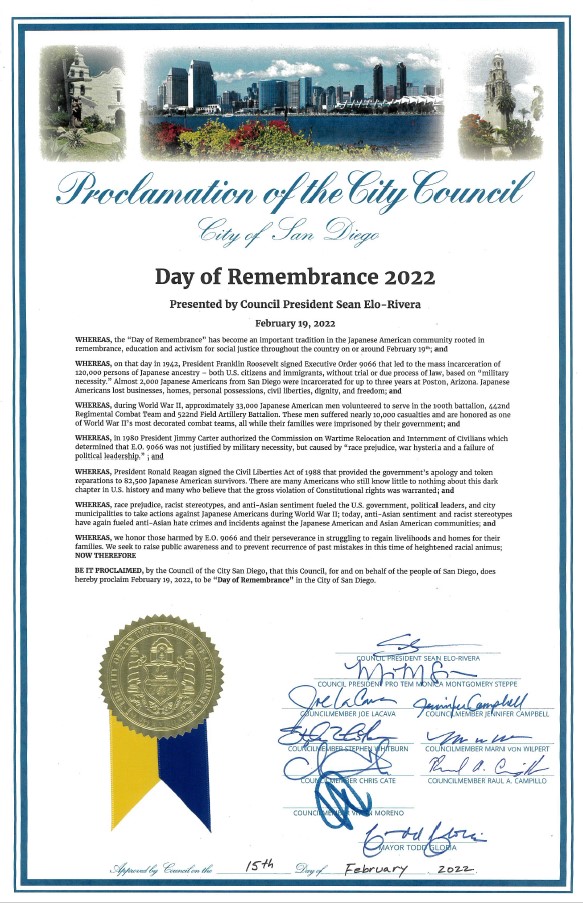
JAHSSD Annual Meeting and Kansha Awards 2019
The Japanese American Historical Society of San Diego held its Annual Membership Meeting and Kansha Awards on Saturday, October 5th, 2019, at Pioneer Ocean View Church of Christ from 11:00 a.m. to 1:00 p.m.
The 2019 Kansha Award were presented to Mits Kawamoto and Susan Hasegawa in recognition of their community involvement and service. Mits is a participant in our Outreach Program and goes out to schools, colleges and libraries to share her experiences during internment and Susan is a long-time educator and historian of Japanese American history. Their involvement with JAHSSD and service to our local Nikkei community has been invaluable.
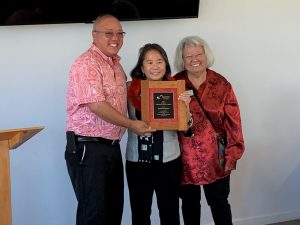
Susan Hasegawa
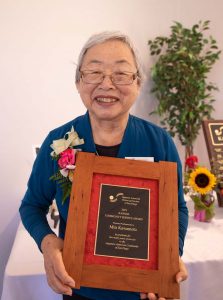
Mits Kawamoto
(Images by Beto Soto)
JAHSSD Annual Meeting and Kansha Awards 2018
The Japanese American Historical Society of San Diego held its Annual Membership Meeting and Kansha Awards on Saturday, October 13th, 2018, at the Buddhist Temple of San Diego Annex Hall, from 11:00 a.m. to 1:00 p.m.
The 2018 Kansha Awards were presented to Joe Cross and the late Guy Kiyoi – two humble community volunteers who never sought the limelight or rewards, but whose service to our local Nikkei community has been invaluable.
75 Years after Executive Order 9066
Experiences of Local Japanese Americans
October 23, 2017
The attack on Pearl Harbor by Japan was certainly a day that will live in infamy. Over 2000 US soldiers were killed, and 1000 injured. The US fleet was critically damaged, losing 20 navy ships and some 300 airplanes.
Even before the Japanese attack on Pearl Harbor, the US government viewed its immigrants from Japan as being potential Japanese spies. Immediately after Pearl Harbor, the US government declared Japanese nationals “enemy aliens” and hundreds were arrested beginning the night of December 7, 1941.
Then, a mere 10 weeks after Pearl Harbor, FDR issued Executive Order 9066. Many of you don’t know what EO 9066 is, much less how it affected 120,000 Japanese Americans and their families during WWII. EO9066, issued on February 19, 1942 by FDR, announced the immediate round up and imprisonment of all people of Japanese descent living on the West Coast of the US. Two-thirds of this group were American citizens, the sons and daughters of the immigrants from Japan.
Most people of Japanese descent living in San Diego at that time were sent first to Santa Anita Racetrack, then on to Poston Arizona for internment/incarceration. Some of these individuals, who were children or teenagers at the time, still live in San Diego today, and their stories are rich with remembrances, sacrifices, even fun times the kids had while in “camp.”
The panel included San Diegans Yukio and Mitsuko Kawamoto, talking about their experience as teenagers during World War II, uprooted from their homes and living behind barbed wire in a Poston, Arizona “relocation center” for three years. Decades later the U.S. government apologized for this egregious disregard of its citizens’ civil rights. but could such radical action by our government ever happen again?
Sponsored by: San Diego UCC Partnership Churches – Partnership for Racial Justice
Organized by: Japanese American Historical Society of San Diego
JAHSSD Annual Meeting 2017
October 14, 2017
Location: Buddhist Temple of San Diego
JAHSSD marked several important events during its annual meeting on October 14: our 25th anniversary, the retirement of Linda Canada from her archivist position, and Debra Kodama’s return to the presidency for 2018. In addition, we sold the final crafts sale with items donated by our intrepid volunteers who named themselves the When’s Lunch? Bunch?
The highlight of the day was adding two honorees to our list of recipients of our JAHSSD Kansha Award. Bruce and Sharon Asakawa were honored for their contributions to the community related to the operation of Presidio Nursery, and their many years on television and radio instructing gardeners on propagation and enjoyment of all types of horticulture.
The second honor was given posthumously to Paul Hoshi, who spent decades volunteering for the San Diego Yokohama Sister City Society and the House of Japan, and who conducted the annual ceremony on New Year’s Eve when the Japanese Friendship Bell was rung. We were delighted that members of both recipient families were able to attend this year’s ceremony.
Linda Canada delivered a talk about achievements and activities of JAHSSD over the last 12 years, and underscored our 2018 theme The Next Level. We were honored to be able to hold our meeting at the Buddhist Temple of San Diego once again, and that Laverne Imori of the Temple staff gave our opening and closing remarks.
75 Years after Executive Order 9066
Experiences of Local Japanese Americans
July 23, 2017
Location: Pioneer Ocean View UCC, 2550 Fairfield Street, San Diego CA 92110
Sponsored by: San Diego UCC Partnership Churches – Partnership for Racial Justice
Organized by: Japanese American Historical Society of San Diego
The attack on Pearl Harbor by Japan was certainly a day that will live in infamy. Over 2000US soldiers were killed, and 1000 injured. The US fleet was critically damaged, losing 20 navy ships and some 300 airplanes.
Even before the Japanese attack on Pearl Harbor, the US government viewed its immigrants from Japan as being potential Japanese spies. Immediately after Pearl Harbor, the US government declared Japanese nationals “enemy aliens” and hundreds were arrested beginning the night of December 7, 1941. Then, a mere 10 weeks after Pearl Harbor, FDR issued Executive Order 9066. Many of you don’t know what EO 9066 is, much less how it affected 120,000 Japanese Americans and their families during WWII. EO9066, issued on February 19, 1942 by FDR, announced the immediate round up and imprisonment of all people of Japanese descent living on the West Coast of the US. Two-thirds of this group were American citizens, the sons and daughters of the immigrants from Japan. It is an honor to present a discussion with former Poston internees Yuki Kawamoto and his wife Mits Kawamoto. It will be moderated by Linda Canada, Archivist at the Japanese American Historical Society of San Diego. Yuki and Mits will talk about how life changed when their families were taken first to the Santa Anita Assembly Center, and later to the internment camp at Poston, Arizona. Stories about day to day life in the camps, as well as the attitudes of their families and friends, will help you understand what it was like to be taken away from the life they had known, and to live among more Japanese people than they’d ever seen before! Finally, they will talk about “moving on” after this disruption, and offer their thoughts about whether the US government might ever do this type of mass incarceration again.
Paradise in Pink Luau – JAHSSD Annual Fundraiser, 2017
July 15, 2017
Location: Pioneer Ocean View UCC, 2550 Fairfield Street, San Diego
Come join us for a Hawaiian luau to celebrate our Hawaiian heritage within the Japanese American community in San Diego. The event, presented by the Japanese American Historical Society of San Diego, will feature: Delicious “Hawaiian” food • Fun entertainment • Kids activities Taiko, hula & ukulele performances • Silent auction with fabulous prizes.
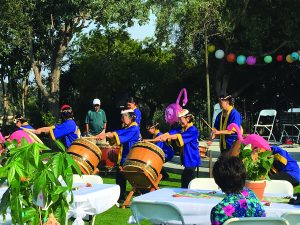
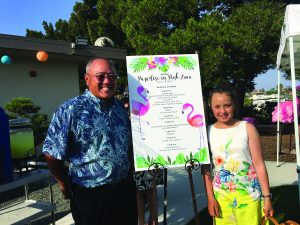
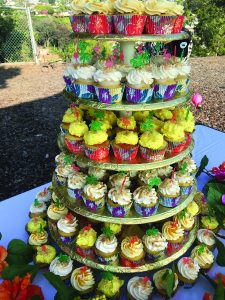
Living Library
Saturday, March 25th, 2017
Location: Oceanside Public Library
JAHSSD members Mits and Yuki Kawamoto participated in a “Living Library” event at the Oceanside Public Library. The event offered various perspectives of individuals whose families immigrated to California. Participants, including representatives of the Hispanic representatives, were seated at tables while visitors were free to move from table to table, getting to know the representatives and their cultural views. Hilary Holley, one of the librarians who helped organize the event, said, “We were so impressed with the quality of conversations and the level of engagement from both our participants and the public. This was our first Living Library event and we are very happy with the result.”
Thanks, Mits and Yuki, for sharing your stories on behalf of JAHSSD.
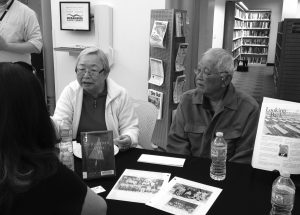
Mits and Yuki Kawamoto
